UNP - led Coalition Government of 1965-70
by W. T. A. Leslie FERNANDO
When the three constituent parties in the ULF, the LSSP, MEP and the
CP had decided that they all should get into the government as one unit
and when that position was endorsed by the seniors in the LSSP like
Colvin, Leslie and Doric, why did N. M. and his supporters took an
initiative for the LSSP only to form a coalition with the SLFP resulting
in the break up of the ULF? Viviene Gunawardena and others who supported
that move believed as Philip Gunawardena achieved much in the 1956-59
regime they expected that the LSSP could do better by forming a
coalition with the SLFP.
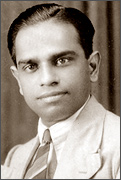 |
| U. B. Wanninayaka |
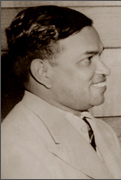 |
| M. D. Banda |
 |
| M. D. H. Jayawardena |
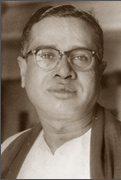 |
| C. P. de Silva |
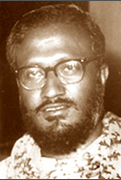 |
| K. M. P. Rajaratna |
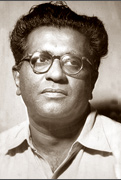 |
| Colvin R. de Silva |
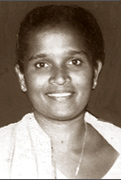 |
| Kusuma Rajaratna |
Colvin R. de Silva and Leslie Gunawardena declined ministerial
positions in the coalition but Vivienne and Chandra Gunasekera became
deputy ministers. Majority of the members who opposed a coalition with
the SLFP led by Edmund Samarakkody and Bala Tampoe left the party and
formed the Lanka Samasamaja Party - Revolutionary Wing.
In due course the executive committee of the fourth International
recognised the LSSP Revolutionary Wing as the body representating the
worldwide Trotskyite movement in Sri Lanka. Forming the coalition with
the SLFP was an indication that the LSSP was deviating from its
revolutionary path and taking to parliamentary politics. Some anlyse
that forming this coalition was the beginning of the downfall of the
LSSP.
Another important event that took place at this time was the division
of the Communist Party into two groups - the Moscow wing and the Chinese
wing. At this time China accused that Soviet Russia was adopting a
reformist attitude and there was a split in world Communist movement. In
Sri Lanka too some in the CP led by N. Shamugathasan and Premalal
Kumarasiri left the CP and formed the Chinese Wing. It is said that Mrs.
Sirimavo Bandaranaike was reluctant to admit the CP to the coalition as
it represented the Moscow wing as she had special relationship with
China and wanted to be neutral in the Soviet-China dispute.
In 1960 March general election although the three Leftist parties,
the LSSP, MEP and the CP won only 23 seats they together polled 790041
votes. Although the SLFP won 46 seats they got only 632827 votes. The
massive support the ULF gathered in the country indicated that the ULF
could override the SLFP. In this situation when only the LSSP joined
that coalition and the ULF came to an abrupt end the MEP was left high
and dry. It so offended the MEP, it began to lean towards the opposition
led by the UNP. However the CP supported the government.
Agency houses
Dr. N. M. Perera presented the coalition Budget as the Finance
Minister on July 30, 1964. The highlights of it were to extend pardon to
capitalists who disclosed their assets and tax them, controlling the
agency houses, formation of the Gem Corporation and permitting the
tapping of toddy. The permit system to tap toddy was withdrawn on the
opposition from the Maha Sangha.
The government taking over the printing of school books from the
private sector and the moves to control newspapers provoked the vested
interests. When the government presented a Bill to take over the Lake
House group, the Lake House initiated a move to oust the government. The
MEP too campaigned with the UNP and the Federal Party for the freedom of
the press.
In the meantime the government prorogued the Parliament on November
12, 1964 and called the new sessions on November 20. However just before
the vote on the Throne Speech was taken 13 members of the SLFP led by C.
P. de Silva crossed over to the Opposition. As a result the government
got only 73 votes as against 74 votes by the Opposition and was
defeated. The three members of the MEP, Edmund Samarakkody and Merryle
Fernando of the LSSP Revolutionary Wing also voted with the Opposition.
The insistence of Philip Gunawardena for the ULF to form a Left
oriented coalition with the SLFP, C. P. de Silva and Maithripala
Senanayaka should be expelled form the government proved partially true
on this occasion as in the words of Prime Minister Sirimavo
Bandaranaike, "C. P. de Silva stabbed from behind". In 1980's
Maithripala Senanayake too aligned with the reactionaries and tried to
get the Hand symbol for the faction of the SLFP formed by him.
The Parliament was dissolved on December 17, 1964 and the nominations
were called for January 11, 1965. The SLFP contested 101 seats and was
in the same camp with the LSSP and the CP as they had a no-contest pact.
The LSSP contested 24 seats and the CP 9 seats. The UNP contested 115
seats. The MEP contested 61 seats but it had some understanding with the
UNP as it did not nominate candidates for several seats like Avissawella,
Kolonnawa, Gampaha and Matugama where MEP was expected to win. Likewise,
the Sri Lanka Samajavadi Nidahas Party led by C. P. de Silva contested
32 seats but the UNP did not nominate candidates to 14 out of them. The
UNP did not contest Mr. and Mrs. K. M. P. Rajaratna who contested from
the Jathika Vimukthi Peramuna.
In the 1965 general election, the UNP won 66 seats, SLFSP 05 seats,
the MEP and the JVP led by K. M. P. Rajaratna one seat each. In the
opposing camp the SLFP got 41 seats, the LSSP 10 and the CP 04 seats.
Although the camp led by the UNP got only 73 seats, it formed an
alliance with the Federal Party and was able to form the government. The
opponents called the 'Hath Hvula' meaning a hotchpotch of seven parties.
Welfare policies
In the coalition government led by the UNP leader Dudley Senanayake,
M. Tiruchelvam of the Federal Party was appointed the Minister of Local
Government and Philip Gunawardena, the leader of the MEP became the
Minister of Industries and Fisheries. At this stage many doubted whether
Philip could be called a socialist anymore. But in the 1965-70 Cabinet
there were gentlemen politicians like Dudley himself, M. D. Banda, U. B.
Wanninayaka and M. D. H. Jayawardena. Dr. Sarath Amunugama equates the
welfare policies of Dudley Senanayake with that of S. W. R. D.
Bandaranaike. Besides in the 1965 election campaign the UNP promised
that it would continue the nationalised ventures.
| The government taking over the printing of
school books from the private sector and the moves to control newspapers
provoked the vested interests. When the government presented a Bill to
take over the Lake House group, the Lake House initiated a move to oust
the government. The MEP too campaigned with the UNP and the Federal
Party for the freedom of the press. |
The 1965-70 Dudley Senanayaka government did not undo the progressive
measures implemented by the 1956-59 MEP regime and the subsequent SLFP
regime from 1956 to 1964, like making Sinhala the state language,
nationalisation of bus transport, the port, banks, insurance companies
and petroleum products Paddy Lands Act, the Schools Take Over and
printing of school books by the government. Charles Wesley Ervin who has
presented a research work on the Trotskyism in Sri Lanka identifies
1965-70 regime as a middle path government.
Philip Gunawardena as the Minister of Industries and Fisheries in the
1965-70 government displayed his usual ability. He streamlined many
public corporations to make them viable institutions. He introduced the
Industrial Development Board and formulated a national industrial
policy. He developed Tyre and Steel Corporation with Soviet aid. He got
Japanese and Chinese aid to facilitate mechanised fishing industry. It
was Philip who put the Fishing Corporation into operation. Charles
Wesley Ervin expresses that Philip never betrayed socialism as he
understood it.
Sinhala colonies
Soon after the formation of the Dudley Senanayaka government it
formulated the Dudley Senanayake-Chelvanayagam Pact to solve the ethnic
issue. The main features of it were to implement regulations for the
reasonable use of Tamil, formation of District Councils, removing
disabilities for the Tamils to join the government service and to give
preference to Tamils in new colonies in the North and in the East.
As the first step to implement Senanayake-Chelvanayagam Pact when the
regulations for the reasonable use of Tamil were introduced the two Left
parties along with the SLFP vehemently opposed it. Dr. Colvin R. de
Silva argued in Parliament the regulations were ultra vires to the
Sinhala only Act. In the procession led by Mrs. Sirimavo Bandaranaike
against it the LSSP and the CP cadres too shouted the slogan "Dudleyge
Bade Masala Vadai" (There is Masala Vadai in Dudley's belly). It was a
surprise to many as in 1956 both the LSSP and the CP stood for parity
for Sinhala and Tamil.
In Senanayake-Chelvanayagam Pact like Bandaranaike-Chelvanayagam Pact
Sinhala was recognised as the State language. But in both the pacts
there were limitations for opening up Sinhala colonies in the North and
in the East.
Dudley Senanayake tried for two years to implement the
Senanayake-Chelvanayagam Pact but failed due to hostility from the
opposition as well as from his own ranks.
Ultimately the Federal Party left the government in 1968.
In 1968 the SLFP, LSSP and the CP joined hands to form a United
Front. They formulated a common programme as well.
|

